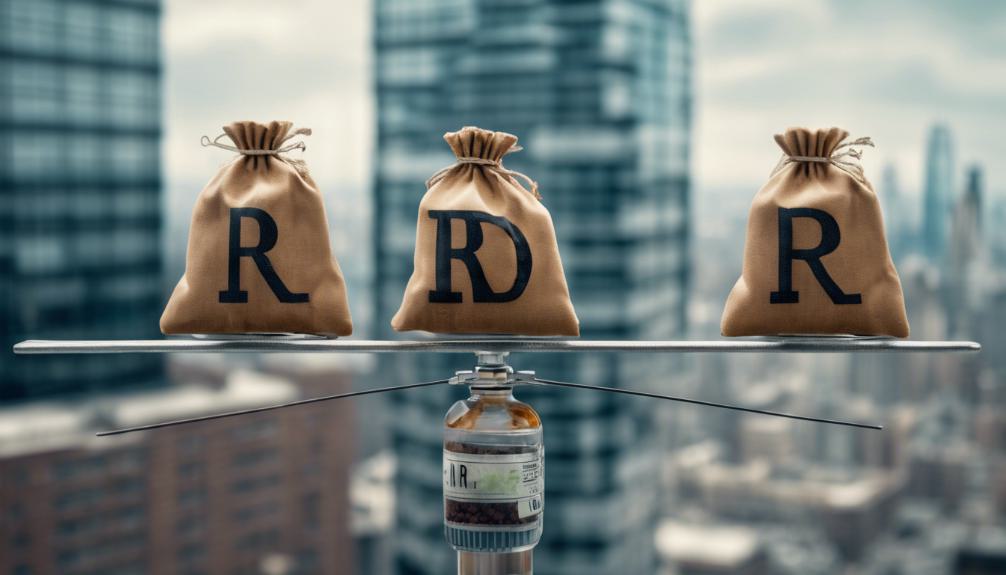Big Pharma's Tightrope: Profits, Penalties, Safety
In the colossal theater of modern healthcare, Big Pharma often appears as both the hero and the villain, juggling sky-high profits and hefty penalties with the dexterity of a seasoned acrobat. We've closely observed this balancing act, noting the staggering $700 billion revenue juxtaposed with the ethical quandaries and safety concerns that loom large. Despite these financial achievements, the shadow of over $80 billion in penalties raises questions about the industry's commitment to public well-being. As we peel back the layers of this complex narrative, one wonders if a true equilibrium between profit, ethics, and safety can ever be achieved, inviting further exploration into this pressing issue.

Key Takeaways
- The pharmaceutical industry has incurred over $80 billion in penalties since 2010, highlighting a significant challenge in regulatory compliance.
- Despite heavy penalties, top pharmaceutical companies reported over $700 billion in revenue and $146 billion in profits in 2022.
- There is a growing concern over the industry's prioritization of marketing over research and development, impacting innovation and ethical standards.
- Calls for reform emphasize the need for a balance between profit-making, consumer safety, and ethical practices within the pharmaceutical industry.
Financial Dynamics and Penalties

Exploring through the financial landscape, we've observed that the pharmaceutical industry has incurred over $80 billion in penalties since 2010. These fines, stemming from violations ranging from safety oversights to misleading advertising, highlight a pressing concern. Companies like Johnson & Johnson, with a staggering $24.5 billion in penalties, underscore the magnitude of these issues. Instances like Purdue Pharma's $8.3 billion penalty shed light on the dire consequences of neglecting ethical standards. It's clear we must advocate for stricter adherence to ethical practices within this sector. Our commitment lies in ensuring that the pursuit of healing and well-being remains paramount, urging the industry to prioritize public safety over financial gains. The call for reform is loud and clear, emphasizing the need for a balance between profitability and moral responsibility.
R&D Versus Marketing Focus

Shifting our focus to the balance between R&D and marketing, it's noticeable that investment priorities greatly influence the future of pharmaceutical innovation and public safety. We've noticed a concerning trend where marketing expenditures sometimes overshadow the critical investments in research and development. This shift not only threatens the pace of groundbreaking discoveries but also the very essence of serving the public's health needs effectively. It's important that we advocate for a realignment of these priorities within the industry. By ensuring that a significant portion of resources is dedicated to R&D, we're not just investing in the future of healthcare but also safeguarding the trust and well-being of the communities we aim to serve. This balance is essential for sustainable growth and the continued advancement of medical science.
Ethical Considerations and Accountability

In the domain of the pharmaceutical industry, we must prioritize ethical practices and accountability to guarantee public safety and trust. Our role extends beyond profit-making; it's about serving communities with integrity. We've seen the consequences when companies neglect this duty, leading to penalties and loss of public trust. We're committed to reforming the industry standards, ensuring our resources are allocated wisely, with a focus on developing safe, effective medications. This commitment to ethical practices isn't just about adhering to regulations; it's about valuing the wellbeing of those we serve. By placing public safety and accountability at the forefront of our operations, we're not just following rules; we're nurturing a culture of trust and responsibility that benefits everyone.
Balancing Profits With Public Safety

As the pharmaceutical industry navigates the complex landscape of healthcare, we must find a delicate balance between maximizing profits and ensuring the safety of the public. We're aware of the significant financial prowess our industry wields, with revenues crossing the $100 billion mark. Yet, we recognize that our duty to serve goes beyond financial success. Our investments in research and development are vital, not just for innovation but for upholding safety standards that protect everyone. We're committed to reallocating resources judiciously, ensuring that our pursuit of profit does not overshadow our responsibility towards public health. It's a tightrope walk, indeed, but one we're dedicated to mastering, prioritizing the well-being of the communities we serve above all.
Legal Impacts and Health Concerns

We must confront the legal ramifications and health risks that have surfaced, impacting both our industry's integrity and the well-being of consumers. It's clear that our path forward requires a steadfast commitment to not only guaranteeing regulations but also prioritizing the health and safety of those we aim to serve. The penalties we've seen, surpassing $80 billion, aren't just financial setbacks; they're stark reminders of our responsibility to society. We're in a position to make significant changes that secure our actions align with our duty to protect and enhance public health. Let's use our resources wisely, focusing on genuine innovation and safety rather than mere profit. It's our collective duty to elevate standards and rebuild trust through actions that reflect our dedication to serving others.
Frequently Asked Questions
How Do Pharmaceutical Companies Justify Their Pricing Strategies for New Drugs in Light of Their High Profit Margins?**
We often point to our doubled profits of $146 billion in 2022, arguing these margins fund essential R&D. This investment drives innovation, aiming to deliver life-saving drugs to those we're committed to serving.
What Specific Steps Are Being Taken by Pharmaceutical Companies to Ensure the Safety and Efficacy of Drugs in the Early Stages of Development?**
We're focusing on rigorous clinical trials and investing in thorough research to make sure our drugs are both safe and effective from the start. Our commitment to these practices aims to prioritize public health above all.
How Do Regulatory Bodies Like the FDA Influence the Marketing Strategies of Pharmaceutical Companies, Especially Concerning Direct-To-Consumer Advertising?**
We've noticed that regulatory bodies like the FDA shape how we market drugs directly to consumers. For instance, they enforce strict guidelines to guarantee advertisements are truthful, ultimately serving the public's best interest.
Can You Detail the Process and Criteria Used by Pharmaceutical Companies to Decide Which Diseases or Conditions Warrant Investment in Research and Development?**
We prioritize diseases with high unmet needs and significant patient impact for our research and development investments. It's important we balance potential benefits with feasibility to make sure we're making meaningful progress in healthcare.
What Mechanisms Are in Place to Ensure the Impartiality of Clinical Trials Funded by Pharmaceutical Companies, Given the Potential Conflict of Interest?**
We're seeking ways to guarantee clinical trials remain unbiased, despite potential conflicts of interest from funding. It's essential to maintain transparency and involve third-party oversight to safeguard the integrity of these essential studies.

This post has been generated by AI and was not reviewed by editors. This is Not legal advice. Please consult with an attorney.




